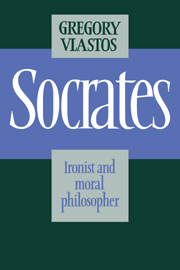Book contents
- Frontmatter
- Contents
- List of additional notes
- Introduction
- 1 Socratic irony
- 2 Socrates contra Socrates in Plato
- 3 The evidence of Aristotle and Xenophon
- 4 Elenchus and mathematics
- 5 Does Socrates cheat?
- 6 Socratic piety
- 7 Socrates' rejection of retaliation
- 8 Happiness and virtue in Socrates' moral theory
- Epilogue: Felix Socrates
- Additional notes
- Bibliography
- Index of passages cited
- Index of names in Plato and Xenophon
- Index of modern scholars
- Index of Greek words
- Frontmatter
- Contents
- List of additional notes
- Introduction
- 1 Socratic irony
- 2 Socrates contra Socrates in Plato
- 3 The evidence of Aristotle and Xenophon
- 4 Elenchus and mathematics
- 5 Does Socrates cheat?
- 6 Socratic piety
- 7 Socrates' rejection of retaliation
- 8 Happiness and virtue in Socrates' moral theory
- Epilogue: Felix Socrates
- Additional notes
- Bibliography
- Index of passages cited
- Index of names in Plato and Xenophon
- Index of modern scholars
- Index of Greek words
Summary
Socrates' “strangeness” is the keynote of Alcibiades' speech about him in the Symposium. The talk starts on that note (215A); and reverts to it near the end:
Such is his strangeness that you will search and search among those living now and among men of the past, and never come close to what he is himself and to the things he says. (221D)
This book is for readers of Plato's earlier dialogues who have felt this strangeness, have asked themselves what to make of it, have pondered answers to its enigmas, and are willing to work their way through yet another. What I offer should not distract them from their encounter with the Socrates who lives in Plato's text. It should take them back there for a closer look.
The book has been a long time in the making. It started with a non-start. A stroke of luck in 1953 had assured me of a year entirely free from teaching. I had gone to the Institute for Advanced Study at Princeton to work on Plato's philosophy, uncommitted as to how I would proceed. Harold Cherniss, the great scholar in my field there, declined to give advice – how like Socrates he was in this. Left to my own devices, I cut the project in half, allocating the whole of that year to a study of Plato's Socratic dialogues.
- Type
- Chapter
- Information
- SocratesIronist and Moral Philosopher, pp. 1 - 20Publisher: Cambridge University PressPrint publication year: 1991
- 1
- Cited by



